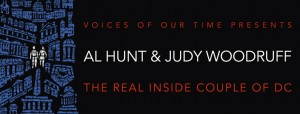Recap of Woodruff-Hunt Voices of Our Time Event
 Lastnight was the Voices of Our Time event on politics and Washington with journalists (and WFU parents) Judy Woodruff of PBS NewsHour and Al Hunt of Bloomberg News. It was a lively 65 minute event, with President Nathan O. Hatch interviewing the couple for most of the time, then questions from Wake Forest students coming at the end.
Lastnight was the Voices of Our Time event on politics and Washington with journalists (and WFU parents) Judy Woodruff of PBS NewsHour and Al Hunt of Bloomberg News. It was a lively 65 minute event, with President Nathan O. Hatch interviewing the couple for most of the time, then questions from Wake Forest students coming at the end.
Here’s a brief recap of some of their comments.
When asked what’s different about Washington now (as opposed to 30 years ago), both Hunt and Woodruff remarked that it is much more negative now, and there is far less ‘after hours civility.’ In decades past, Republicans and Democrats had friendships that extended outside of the walls of Congress – they dined together, had drinks in the evening, etc. but much of that fraternization has ended. More congressmen and women do not move their families to DC now and choose to go home every weekend – and perhaps that is part of the reason for the partisanship: people don’t get to know each other – or their spouses and families – if they aren’t around in DC.
When asked about the rise of online journalism and social media and the state of print newspapers, Hunt asked the audience to raise their hands if they read a daily newspaper [in print] anymore. About 3/4 of the audience raised their hands – and I would estimate that the bulk of the audience were people over 50. Hunt then asked the students present to raise their hand if they read a daily print newspaper, and not a single hand went up; they all get their news online. Hunt said he thinks journalism proper is not in danger – we will always need to report the news, but the media we use is certainly changing drastically and he questions how print papers will fare.
The pair was asked about cable news and the partisan soundbite atmosphere. They both said there is a “food fight” mentality in some of those shows, where each political side has a venue to shout at each other. They also remarked that people tend to be aware of the presumed biases of certain networks, and that people tend to watch the cable stations that most closely mirror their own political views.
As you might expect, they were asked their predictions for the 2012 presidential elections. Hunt said he thinks Obama has an edge as an incumbent, and that he thinks the big themes of the election will be the economy, the role of government and its spending priorities, and the war. If any of those three things go way South, it will help an opponent. If they improve, it will help Obama. Woodruff added that the most personal vote a citizen makes is for president, and it can come down to individual voters asking themselves “who do I feel most comfortable with as president? this guy or the other guy?”
When asked about their children and how they raised them in the middle of Washington, the pair differed on their approach. As a news anchor and interviewer, Woodruff said she always felt she needed to keep her political views very private, even from her own family. She did not want to color anyone else’s views or give away her own so it wouldn’t affect her impartiality in her work. Hunt’s job in the latter years was as a columnist so he was clearly providing his opinion in the newspapers. He said that they took each of their three children to New Hampshire the weekend before the presidential primaries so they could see what was going on – he said it was the “best lab ever” for young people to witness. And he recalled a story when he was trying not to influence his son’s opinion of a particular candidate, but ultimately told his son ‘this guy is a nut job!’ (Much laughter followed).
In closing, both Hunt and Woodruff recommended journalism to interested students. Woodruff’s own work with the Millennial (aka current college students) generation said gives her great optimism about our future. The Millennials are independent and want to chart their own path, they are outspoken but close to their parents, more diverse, and more open. She feels like this generation will be ready and willing to tackle problems of the future. Finally, Hunt said that “every time I go to a university, I feel good. I feel great.” He said that being able to be a college student and have the ability to access everything from music to athletics to academics is important because of the broad exposure to all areas.
It was a wonderful event from start to finish.
